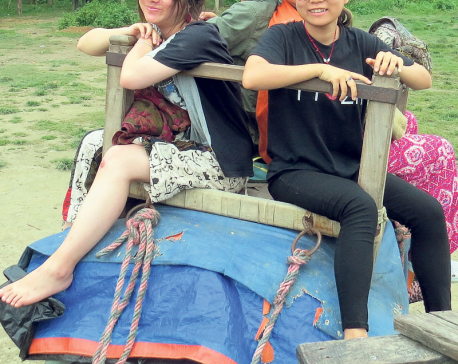
OR
Crocodile Breeding Centre in Chitwan in need of potent male crocodile
Published On: December 14, 2020 01:18 PM NPT By: RSS

CHITWAN, Dec 14: The lack of potent male crocodiles in the Crocodile Breeding Centre at Kasara in Chitwan district has been a cause of concern for the officials at the centre for it would lead to zero reproduction of hatchlings.
There is only an old male crocodile here, aged 42 years. It has ceased engaging in reproductive activities due to which as many as 300 eggs laid by female crocodiles in last April could not be hatched, said Chitwan National Park's assistant conservation officer Bed Bahadur Khadka.
The eggs collected from various river banks are hatched at this Centre which has a total of 656 crocodiles at present and has set free around 1,600 hatchlings in various rivers so far, according to the Chitwan National Park.
Although normally male crocodiles are found to be actively engaging in reproductive activities till 50 years, the 42-year-old only male crocodile at the centre did not help hatch any eggs this breeding season, according to Khadka. Crocodiles have an average lifespan of 60-70 years as humans.
Khadka is worried that all the eggs at the centre would go in vain if the centre could not timely arrange a potent male crocodile for hatching the eggs. "The only male crocodile at the centre could be suffering from sperm related issues given his old age," opined Khadka, adding that there were not any veterinary doctors in Nepal to study and examine crocodile's sperm.
The park had already brought the issue to the notice of the authorities concerned last July. Preparations were made to bring a male crocodile of reproductive age from Bardiya National Park, informed Haribhadra Acharya of the Department of National Parks and Wildlife Conservation.
Acharya said that they could bring an adult male crocodile from India as well but the current situation was not favourable for the same due to the COVID-19 pandemic.
Altogether five male crocodiles were reported in the Rapti River and the Narayani River, they could not be trapped and used for reproductive purposes as those reptiles were yet to reach their reproductive age, added Assistant Conservation officer Khadka.
You May Like This

Changing trend of tourist flow in Chitwan
CHITWAN: Nepal is a country that unabashedly boasts a huge influx of tourists who come here to witness pure nature... Read More...

1 killed, 1 injured in Chitwan road accident
CHITWAN, April 17: One person was killed while another one was injured in a road accident happened at Jugedi of... Read More...

Tiger kills man in Chitwan
CHITWAN, Sept 17: A tiger on Friday killed a 52-year-old man in Chitwan National Park (CNP). ... Read More...





Just In
- CM Kandel requests Finance Minister Pun to put Karnali province in priority in upcoming budget
- Australia reduces TR visa age limit and duration as it implements stricter regulations for foreign students
- Govt aims to surpass Rs 10 trillion GDP mark in next five years
- Govt appoints 77 Liaison Officers for mountain climbing management for spring season
- EC decides to permit public vehicles to operate freely on day of by-election
- Fugitive arrested after 26 years
- Indian Potash Ltd secures contract to bring 30,000 tons of urea within 107 days
- CAN adds four players to squad for T20 series against West Indies 'A'













Leave A Comment